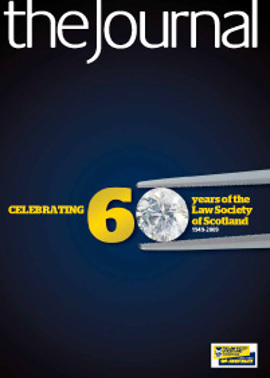Striving after fairness
In 1949 Scottish reparation lawyers would have been conscious of practising in a period of rapid transition. The workmen’s compensation scheme, in its day a radical attempt to introduce a no-fault compensation model providing basic levels of support, had been swept away in 1946. In the nascent post-war welfare state it was replaced in 1948 by a range of industrial injuries benefits and pensions. From then until 1989 a key feature of the benefits system was that only half the payments received were offset against damages recovered, the employee’s national insurance contributions having funded the other half. The 1989 changes which introduced the current regime of deducting the entire benefits were rightly seen as heavy handed and unfair.
It may surprise current practitioners that until the Law Reform (Contributory Negligence) Act 1945 introduced apportionment of liability between pursuer and defender, any finding of contributory negligence acted as a complete defence. Similarly, the doctrine of common employment, which prevented an employee suing his employer vicariously for a fellow employee’s negligence, had been abolished as recently as 1948.
Although workplace health and safety legislation had existed for 100 years, its application was patchy and piecemeal. Many workplaces fell through the legislative net. Anomalies were not uncommon: a hospital laundry was covered by the Factories Acts; a hospital kitchen was not. Regulations based on EC directives have transformed the position and now provide a coherent and comprehensive system of statutory protection.
Smoothing the system
Procedurally, the traditional Scottish obsession with written pleadings was enjoying its heyday. Those of us who have long regarded this as an obstacle, rather than an aid, to justice have been largely vindicated by the success of the Coulsfield reforms which introduced simplified pleadings to the Court of Session. Reading the reports in 1949 Scots Law Times confirms that those were simpler times with simpler lives. Even allowing for inflation, damages were low and usually comprised only solatium and loss of earnings. Heads such as services, pension loss and care costs lay far in the future. It is easy to forget that actuarial multipliers have been with us for little more than a decade.
No one who reads the late Lord Stott’s diaries could fail to marvel at the number of jury trials in the 1950s. Happily, later attempts by successive Lords President to consign them to history were unsuccessful. Although they have staged a minor revival, it is unlikely that they will ever regain their former prominence. Their importance in providing a barometer of public opinion, particularly in fatal cases, cannot be overstated. The hope is that those judges and bureaucrats who view them as an anachronism and an administrative inconvenience will not prevail.
At this remove, the way reparation actions were funded must, to some extent, be a matter for conjecture. Civil legal aid had yet to come and (largely) go. Presumably trades unions and speculative fee agreements played an important part. No change there, then. Speculative actions were long established in Scotland although, until recently, much was left unsaid, particularly in relation to the consequences for the unsuccessful pursuer. Legal expenses insurance was unknown, as were outlays-funding schemes. Speculative funding backed by indemnity insurance is likely to become ever more important with the increasing complexity of litigation.
Uncertain future
What will the litigator of 2059 look back on, assuming such creatures will still exist? To survive, they will have had to resist the blandishments of the mediation industry, which will no doubt continue to hold itself out as the acceptable face of dispute resolution. They will also have overcome the best efforts of the insurance industry and central government to create a climate in which litigation is seen as evidence of failure rather than an important civil right.
They may have cause to be grateful to such a distinguished commentator as Lord Rodger of Earlsferry, who said in a recent speech on the future of civil justice in Scotland (Journal, August 2008, 14): “While I see the case for extending the use of pre-litigation protocols, I confess that I am rather suspicious of any approach which treats the courts and judges as something to be avoided if a substitute can be found. That does not seem to me to be the kind of society which is guaranteed to citizens of the United Kingdom by article 6(1) of the European Convention on Human Rights… [If] people… come to court and the litigation is to be conducted by lawyers and can be financed, the courts should not act like a branch of the nanny state, but should treat litigants as responsible adults… who, with the help of their legal advisers and, in particular, their insurers, can be expected to judge their own best interests. The courts have the power to award expenses as a means of penalising any abuses of the system.”
In this issue
- Defining year
- At the heart of the debate
- In shape at 60
- Banks doing business
- To take us forward
- Striving after fairness
- Knowledge is protection
- The changing role of the law school
- Risk: nip it in the bud
- Close relations
- Conference keeps getting better
- Booming baby boomer
- Channel vision
- Variations on a theme
- Customer survey scores a plus
- Prepare for the upturn
- New look Society gets go-ahead
- Backing for "Wider Choice"
- Private client tax specialists recognised
- Law reform update
- From the Brussels office
- Target 2010
- Questions of our times
- Ask Ash
- Breaking the chain
- What will they do next?
- Sins of emission
- Scottish Solicitors' Discipline Tribunal
- Are we ready?
- Website review
- Book reviews
- Duty within bounds
- Change to fair
- Home reports update






